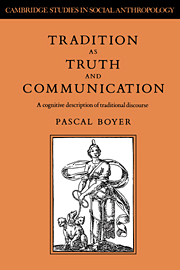Book contents
- Frontmatter
- Contents
- Preface
- Acknowledgements
- 1 Conserved world-views or salient memories?
- 2 How to think with ‘empty’ notions
- 3 Criteria of truth
- 4 Customised speech (I): truth without intentions
- 5 Customised speech (II): truth without meaning
- 6 Customised persons: initiation, competence and position
- 7 Conclusions and programme
- Notes
- Bibliography
- Index
- Cambridge Studies in Social Anthropology
6 - Customised persons: initiation, competence and position
Published online by Cambridge University Press: 27 August 2009
- Frontmatter
- Contents
- Preface
- Acknowledgements
- 1 Conserved world-views or salient memories?
- 2 How to think with ‘empty’ notions
- 3 Criteria of truth
- 4 Customised speech (I): truth without intentions
- 5 Customised speech (II): truth without meaning
- 6 Customised persons: initiation, competence and position
- 7 Conclusions and programme
- Notes
- Bibliography
- Index
- Cambridge Studies in Social Anthropology
Summary
A salient aspect of traditional situations is that the access to truth, more precisely the capacity to make true statements, is reserved for persons placed in certain social positions. If one considers traditional statements as the expression of transmitted ‘theories’ or ‘world-views’, there are two ways of explaining why truth-bearing discourse is thus reserved for certain actors. The first solution is to have an ‘authoritarian’ idea of the groups concerned, i.e., to claim that in such groups whatever is said by the ‘powerful’ is held true. The second possible solution is that the actors concerned have a special competence, notably a greater knowledge of traditional ‘theories’ than ordinary speakers. At the end of chapter 3, I mentioned the problems created by the ‘authoritarian’ interpretation. The main difficulty is that the claim just begs the question of the intellectual processes whereby a person is endowed with traditional ‘authority’. If position is a simple criterion of truth, why and how is it considered a criterion? If, for example, shamans are the only ones who can say the truth about the spirits, what are the listeners' representations about this capacity? Apparently, the only reasonable answer to this question is some notion of ‘competence’; the privileged speakers have more knowledge than the others. This is the most natural hypothesis; in fact, if the veracity of utterances is evaluated on the basis of their content, it is the only reasonable hypothesis.
- Type
- Chapter
- Information
- Tradition as Truth and CommunicationA Cognitive Description of Traditional Discourse, pp. 94 - 106Publisher: Cambridge University PressPrint publication year: 1990

